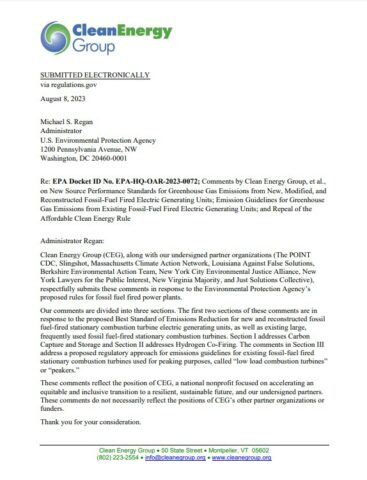Clean Energy Group Comments on EPA’s Proposed Rules on Greenhouse Gas Emissions Limits for Power Plants
August 7, 2023
Seth Mullendore, Abbe Ramanan, Shelley Hudson Robbins | Clean Energy Group
Clean Energy Group, along with The POINT CDC, Slingshot, Massachusetts Climate Action Network, Louisiana Against False Solutions, Berkshire Environmental Action Team, New York City Environmental Justice Alliance, New York Lawyers for the Public Interest, New Virginia Majority, and Just Solutions Collective, submitted comments in response to the Environmental Protection Agency’s (EPA) proposed rules for fossil fuel fired power plants. The EPA proposed changes to the Clean Air Act related to greenhouse gas emissions from fossil fuel-fired electric generating units. The proposed rules would require new power plants as well as existing baseload plants to either install carbon capture and storage (CCS) technology with a 90% capture rate or begin combusting a blend of hydrogen and natural gas to meet EPA greenhouse gas regulations.
The comments are divided into three sections. The first two sections are in response to the proposed Best Standard of Emissions Reduction (BSER) for new and reconstructed fossil fuel-fired stationary combustion turbine electric generating units, as well as existing large, frequently used fossil fuel-fired stationary combustion turbines. Section I addresses Carbon Capture and Storage and Section II addresses Hydrogen Co-Firing, noting that neither CCS nor hydrogen meet the requirements to be considered a viable pathway for emissions reduction. CCS is only in operation at one active power plant in the world, the technology has never sustained a 90% emissions capture rate, and the additional fuel required to power the technology leads to an increase in nitrogen oxide (NOx) emissions of anywhere from 5%-60%. Combusting hydrogen leads to an increase in NOx emissions of six times that of natural gas. Hydrogen itself is also an indirect greenhouse gas that has a short-term global warming impact 35 times higher than carbon dioxide (CO2). The comments in Section III address a proposed regulatory approach for emissions guidelines for existing fossil-fuel fired stationary combustion turbines used for peaking purposes, called “low load combustion turbines” or “peakers.” The comments recommend battery storage as a proven, effective emission reduction approach for peaker plants.





